Parents tend to get shortchanged in dramatic genre stories, but that just makes the inspiring ones all the more noticeable! For Father’s Day, the Tor.com office is recalling its favorite dads in science fiction, fantasy, and anywhere! You know who they are. They’re the guys who stuck around to serve as inspiration and support to their (often heroic) children…and who managed to survive the dramatic whims of their creators!
Benjamin Sisko (Star Trek: Deep Space Nine)
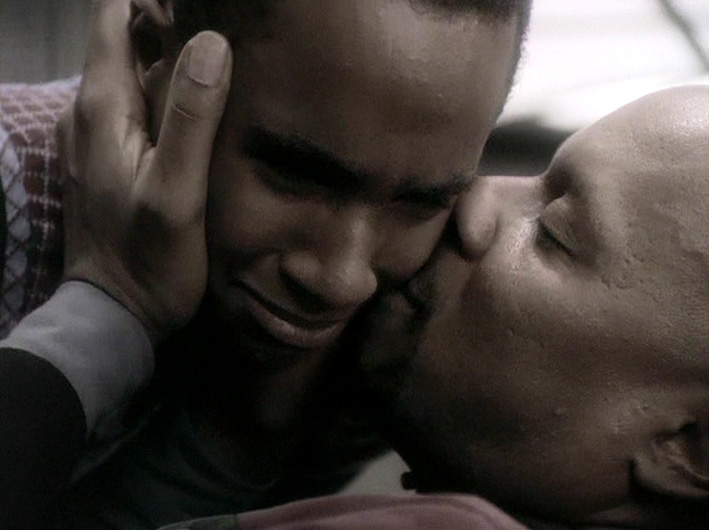
Star Trek: Deep Space Nine opens with Benjamin Sisko fighting for his family amongst the backdrop of the adventures of Captain Picard and the Enterprise crew, and over the course of seven years and a war that spans the galaxy, the show never loses sight of what is truly important to Captain Sisko: His family as represented by his son Jake.
“That was something else you still don’t often see on air, at least as it concerns black and brown men and their sons,” actor Avery Brooks told Nashville Scene in 2012. “We got to play complicated, emotional and intricate scenes, and we got to have tender and fun moments. It wasn’t a pat relationship or an easy one, and it was very realistic.” Portraying a solid, loving relationship between father and son was so important to Brooks that he altered the ultimate fate of his character. Instead of ascending into demi-godhood forevermore, as was the original intent of the show finale, Ben Sisko tells his new wife and their unborn child that he will never abandon them. –Chris
Arthur Weasley (Harry Potter)
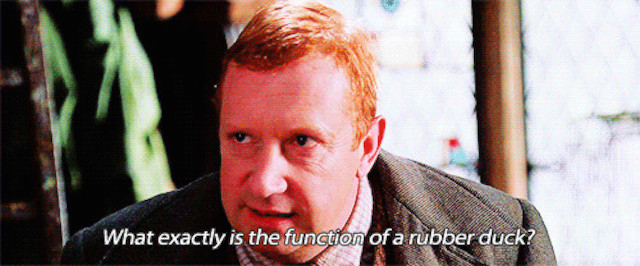
Talk about one of the best dads out there in sci-fi/fantasy! Arthur Weasley was not merely a not-bad father; he was a great father. He always loved his family, and protected them in the darkest of times during both the First and Second Wizarding War against Voldemort and the Death Eaters. Arthur clearly takes joy and purpose from his brood of Weasleys, working long hours to support them, and welcoming his children’s friends and significant others into the home, even if they didn’t have quite enough to go around. He may have been financially poor, but he’s clearly one of the richest fathers in all of sci-fi/fantasy. (Even Rowling couldn’t bear to kill him off. And she tried.) –Bailey
Stoick the Vast (How to Train Your Dragon)
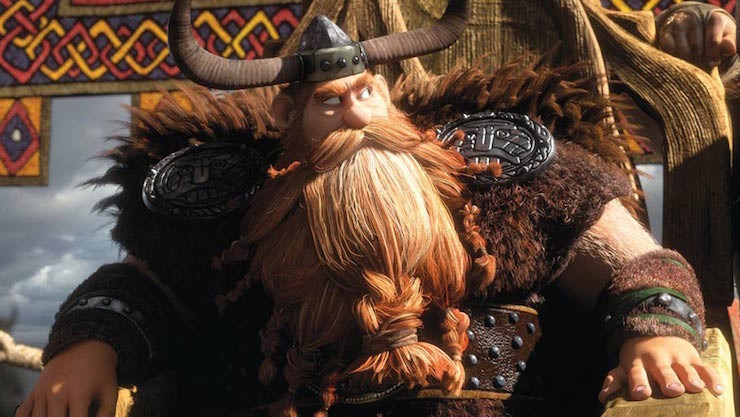
Stoick was a good Viking, strong, kind, a leader to his people, and also rather stubborn. Throughout most of Stoick’s life, he was what was expected of him (see: qualities listed above). But although he became angry when his Viking son seemed to side with their enemies, the dragons, Stoick had the depth of character to step back and rethink the origins of his stubborn attitudes. What was more important to him: understanding his son’s empathy for others, or upholding tradition? Stoick makes the right choice in the end, and the support that Hiccup receives from Stoick ends up changing the course of their entire world. –Bailey
Rupert Giles (Buffy the Vampire Slayer)
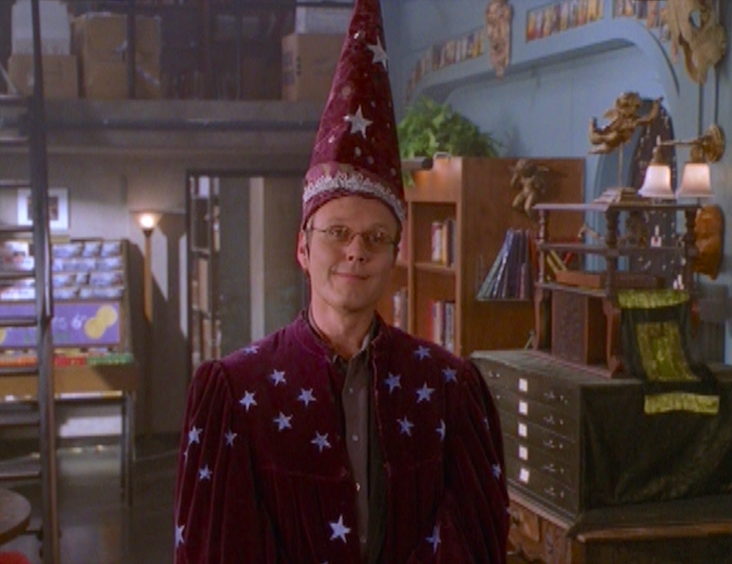
Thanks to George Michael, the phrase “father figure” will always evoke a certain ’80s pop hit. But how about instead of a pop star we think of Rupert Giles: Watcher extraordinaire, and father figure not just to Buffy, but to the whole Scooby Gang? Although it’s Giles’ relationship with Buffy that puts him squarely on the list of great-dads-and-dad-like-figures. Just thinking about Buffy’s speech in the first season finale, “Prophecy Girl,” can still just about bring me to tears, and part of the reason for that is Giles’ response. He can’t just be her Watcher, because he loves her, and she doesn’t just want to be the Slayer. She wants to live. From then on, their relationship is one of the pillars that holds up the show. Bit by bit, Giles is portrayed as more complex, more and more his own person, full of secrets, with a past full of meaningful choices, both good and bad. He saves Buffy, he infuriates Buffy, he tries to teach her everything he can—and he reminds her that adulthood is as varied and strange as it is inevitable. As someone who grew up with a deeply influential stepfather, I love all these things about Giles, but most of all I love the way Giles’ flaws and his brilliance and his love all work together to make him the person he is. Perfection isn’t required. Honesty is. –Molly
Tam al’Thor (The Wheel of Time)
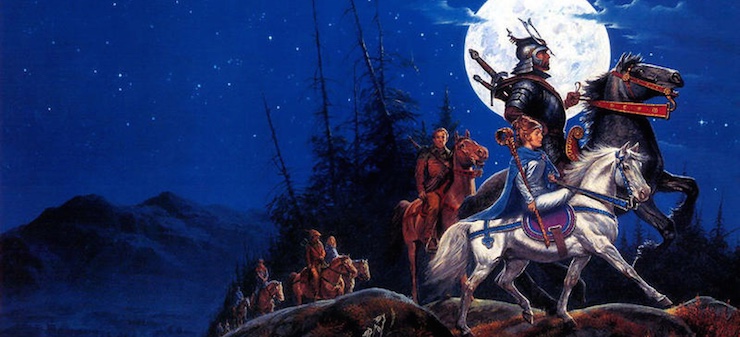
Tam, the father of The Wheel of Time’s prophesied savior Rand al’Thor a.k.a. The Dragon Reborn a.k.a. He Who Comes With the Dawn a.k.a. Lord of the Morning a.k.a. That Guy Who Gets Really Isolated and Angry and Weird as The Series Goes On has only a brief onscreen presence in the 14-volume series, but the care and love we see how him show Rand underpins Rand’s entire journey from farmboy to savior. Over the course of the epic, Rand grapples with his conscience as much as he grapples with monstrous light-consuming evil, and he slowly goes mad over the course of the series as a result. Giving in to the madness, giving in to the Shadow and becoming a tyrant, is an option offered repeatedly offered to Rand, and one he repeatedly rejects. The kindness and honesty that Tam instilled in young Rand is that much a part of his core being; a constant representation of the good that will be lost should Rand give in to darkness. And when it seems that Rand is finally about to give in to the Shadow, it is Tam who reappears and pulls him back. In the end, Rand saves the world, but only because his father Tam makes him into a man capable of saving an entire world. –Chris
Sully (Monsters, Inc.)
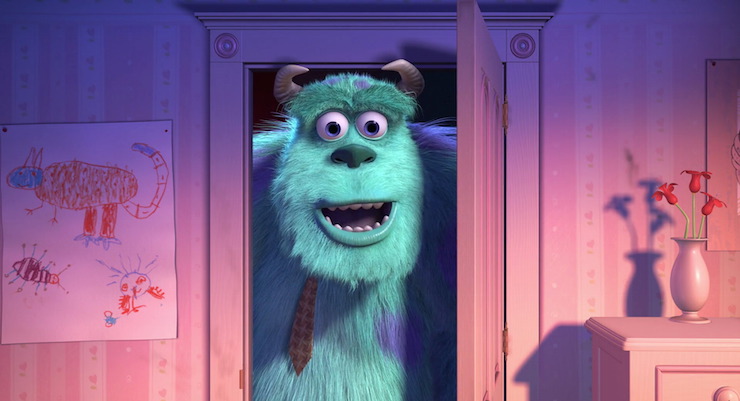
Though not Boo’s biological father, Sully surprises both the audience and himself by taking on that role when Boo accidentally wanders into the Monster World. In her, Sully finds the inner strength to stand up to an entire society–and his best friend Mike Wazowski–and insist that they look beyond their routines and their easy lives and do the right thing. Sully becomes Boo’s unwavering protector, and it rips his heart in half to let her go, much as it does any loving father when they usher their child out into the world.
Sully’s growth into a great father is all there in the final frame of the movie. That smile. That smile. That is pure parental joy. –Bailey
Marlin (Finding Nemo)
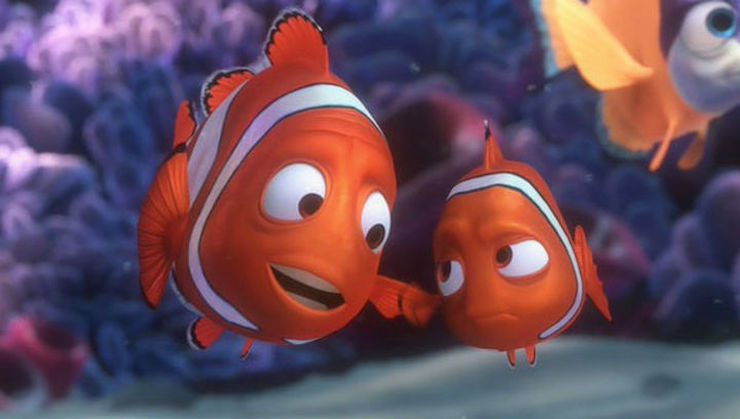
While we’re talking about Pixar we should talk about Marlin from Finding Nemo. At first, Marlin’s a real downer. It seems like he’ll never be able to see past his kid’s disability (in this case, Nemo’s “lucky fin”). But there’s more to it than that, of course. Marlin is neurotic because he knows how easy it is to lose a child, and that gets translated as a hyper-focus on Nemo’s fin. Marlin brings a lot of emotional damage into the father/son relationship, but he’s exceptional because he’s always trying to not let his anguish become a permanent shadow upon his son’s life. He doesn’t always succeed, but when he does, it is spectacular to behold. –Natalie
Jim Gordon (Batman)
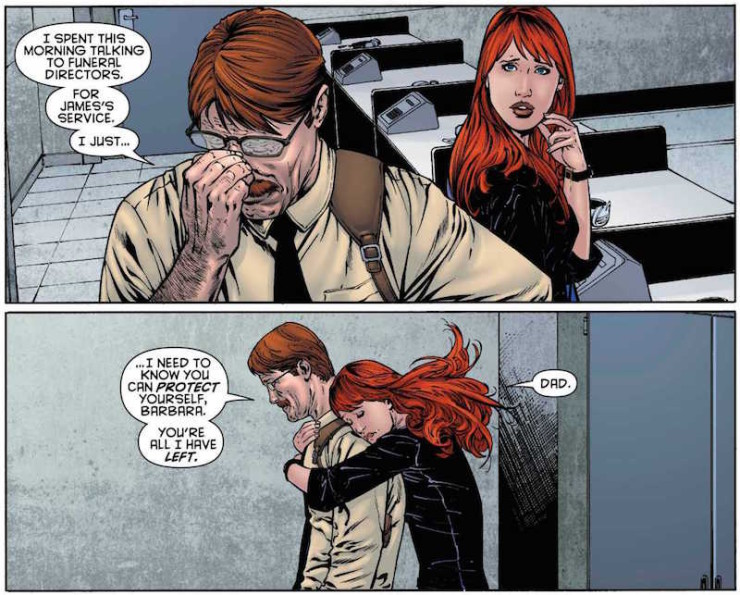
For every foot of Gotham that Commissioner James Gordon takes back from the city’s criminals, his family moves incrementally away from him: His wife divorces him (or tries to kill him, depending on the story); his daughter Barbara is used as a pawn, shot by the Joker in The Killing Joke with the sole intent of driving Jim insane; and his son James, Jr. is a full-blown psychopathic murderer who delights in showing his father just how much the Gordon family has fragmented. As long as Jim works to keep the city safe, his family will inversely be more unsafe, yet he never stops sending out the Bat-signal when needed.
But there’s some hope, as he and Barbara reconcile in the small ways they can: training at the shooting range, working together (knowingly or not) with Batman. Jim has two families—the Gordons and Gotham—and he does everything in his power to protect both of them. Even when they tear each other apart. –Natalie
Gomez Addams (The Addams Family films)
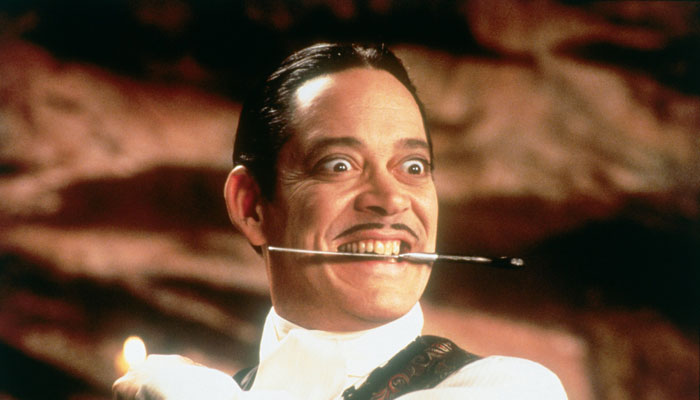
Sure, he condones murder and torture, but really only to those who kind of have it coming (or are too dumb to avoid one of Pugsley’s bear traps). For the most part Gomez Addams, as portrayed by Raul Julia, is a creature of enthusiasm and passion. He wants everyone around him to be the best “them” that they can be, even if that “them” is an unholy shuffle-monster of a brother, or an unscrupulous accountant, or just a hand. Gomez is thrilled when someone reaches beyond their comfort zone, even if they threaten his life by doing so. And he gives everything of himself to make sure his family and friends have a supportive environment in which to grow and enjoy life. Gomez gives so his family can grow. He’d dance the Mamushka while Nero fiddled. He’d dance the Mamushka at Waterloo. He’d dance the Mamushka for Jack the Ripper. But also, sir or madam or Thing, he’d dance the Mamushka for YOU. –Chris
Data (Star Trek: The Next Generation)
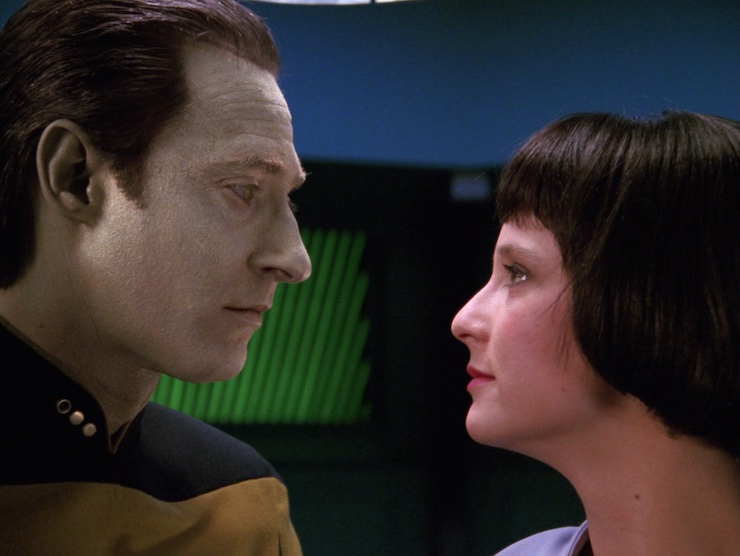
The best dad in all of science fiction is clearly Data. In one of my all-time favorite ST:TNG episodes, “The Offspring”, Data creates a working, sentient Soongian android, and he, the crew, and a Starfleet representative, Admiral Haftel, spend the rest of the episode asking whether this android is his child, or simply a new piece of tech for Starfleet to play with. Like all the best Next Gen episodes, “The Offspring” asks thorny questions about free will, sentience, and the responsibility we have to our fellow creatures. But all that aside: Data’s a great dad! First, he names her “Lal” which means “darling” in Hindi, allows her to choose her own race and gender from several thousand examples he prepares for her, and supports her eventual choice to be a human female. He sends her to school to socialize with other children, and when that doesn’t go well, let’s her have a job in Ten Forward, where Guinan can keep an eye on her. He shuts down Commander Riker before he can get too Riker-y by asking, “What are your intentions toward my daughter?” and, when Lal asks why the two of them should bother trying to be human when they’ll never succeed, he replies:
I have asked myself that many times, as I have struggled to be more human. Until I realized, it is the struggle itself that is most important. We must strive to be more than we are, Lal. It does not matter that we will never reach our ultimate goal. The effort yields its own rewards.
That? That is Grade-A parental advice. When the episode takes a tragic turn, and Lal’s brain suffers a cascade failure, it also seems to trigger her ability to feel real emotions. Data accepts that his daughter has evolved beyond him, takes pride in her growth, and finally uploads her consciousness and memories into his own mind rather than allowing her to fully die. Instead of moving on from what is, essentially, an engineering failure, he chooses to take on the burden of carrying her with him in his own mind. –Leah
Keith Mars (Veronica Mars)
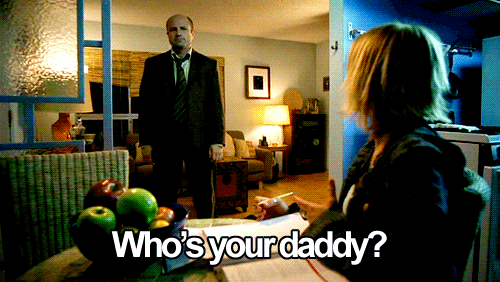
Yeah, I know it’s not sci-fi/fantasy, but Veronica Mars has one of the best dads ever. Private Investigator and former Sheriff Keith Mars is everything any cynical and snarky teen could ask for in a dad: he’s smart, he’s grounded, he tells the best dad jokes, and he has access to all the best sleuthing databases and gadgetry. His close relationship with Veronica is based on genuine affection and a sense that they both belong in a screwball comedy that happens to be written by Raymond Chandler. But best of all, Keith always remains believably a dad—even when they’re pal-ing around, he’s protective and authoritative and completely justified in worrying over Veronica’s extracurricular investigations. I mean, she did get herself locked in an ice chest during an attempted arson… Veronica, I hope you send Keith some very nice golf clubs this year for his troubles. –Sarah
Jonathan Kent (All-Star Superman)
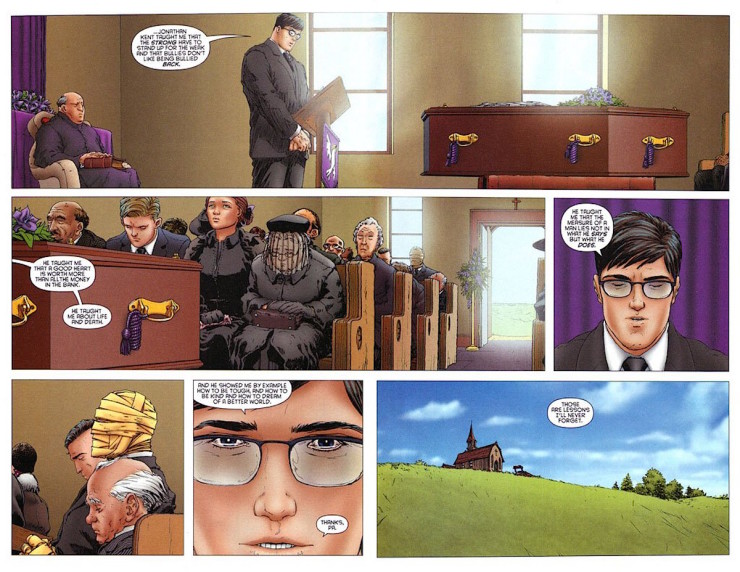
The above spread from Grant Morrison and Frank Quitely’s All-Star Superman says it all. –Chris










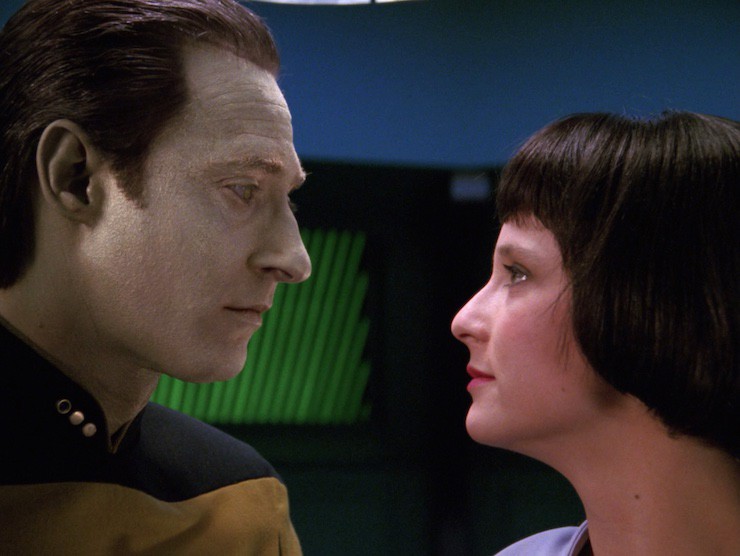
I will never forget watching Deep Space Nine’s “The Visitor” for the first time. It was some of the most gut-wrenching television I’d ever seen. It worked not only because of the strength of the writing, but because of the long and built-up story of Jake and Ben’s relationship. Seeing Ben on this list instantly took me back to that episode.
And that one shot when Ben is just watching elderly Jake sleep, this sad little smile on his face…such a good episode.
I know DS9 ended 17 (!!) years ago but I would love…LOVE…if for the 50th anniversary Paramount/CBS/whomever was putting together a DS9 anthology mini-series that shows where everyone is a few years down the road. Kira ushering Bajor into the Federation, the Siskos reunited, Worf continuing to make wacky career choices, O’Brien fixing everyone’s mistakes…*
*I know the books did this, but it’d be wonderful to see the actors embody those roles again.
Stoick’s parenting is one of the best recurring motifs in the Dragons TV series too.
I’d also place a vote for Greg Universe, Steven’s dad. Sure, he may not be in his son’s life as much as a normal family (like Connie’s) might expect, but he is unhesitatingly there for his son, teaching him all the important things that the Gems can’t.
Also, Kotetsu T. Kaburagi from Tiger & Bunny, who continues to place his life on the line as a superhero because he refuses to let his child grow up in a world where people don’t do everything in their power to help others –and who keeps it secret from her because he doesn’t want her to worry about him.
1) Gomez Addams from the TV SHOW—at least as wonderful a father as the movie version
2) Awesome stepdad: Baslim the Beggar from Heinlein’s Citizen of the Galaxy
3) DARTH!!!!!
Shout out to Kevin’s dad (whom he calls “Abba”) from Guy Kay’s The Fionavar Tapestry.
I question Data’s inclusion on the list. He was a terrible father. His design was flawed and ultimately failed. Had he spent perhaps 2 or 3 more computer cycles on his design, Lal would have survived.
I feel like the dad in Twilight Saga was on point, considering what he had to deal with.
I’m a little sad there’s no shoutout for Aral Vorkosigan in this list.
I LOVE YOU FOREVER FOR INCLUDING KEITH MARS ON THIS LIST :D
I have always had a really good relationship with my dad, so I love seeing other great dad/daughter (or son) relationships – because I know how formative it is.
In terms of genre examples, Sisko and Arthur Weasley may be my favorites :) I agree with you wholeheartedly about Tam too, and Data.
If I had to pick a few more, I’d perhaps pick:
Mufasa from the Lion King
J’onn in the Supergirl TV series (who acts as a surrogate father to Kara/Alex in some ways)
Uncle Ben from Spider-Man (although he gets killed off fairly early in the story).
Not a ton of great parenting going on in Game of Thrones but I always appreciated how Brienne’s father trained her and gave her the skills to survive as she was.
Duplicate comment – Tor’s comment functionality is still pretty touch and go since the ‘new’ site redesign.
I always found the best part of DS9 for me was the incredible relationship between Ben and Jake (Jake-o!) Sisko. It was believable, loving and respectful, and so real.
Matt Wagner beat me to it, but yes. Aral Vorkosigan was a damn good father, but perhaps not as high-profile as some of these sci-fi/fantasy dads. :D
Aral, heck yes. Despite being Regent to a planet, took two hour lunches each day to play with his crippled son. Yes, that counts. Miles himself looks to be doing well from what we can see in the later books.
re Game of Thrones, it has to be Ned. No one else looks to come close (except for Brienne’s Dad – I can buy that).
re Wheel of Time – Tam, heck yes.
Here’s a new one – in Abraham’s Dagger and Coin series, a strong vote for Geder Pallianko’s Dad, who remained a strong voice of love and support for his son as a person even while Geder was not always acting in the a way that did honor to his father.
Johnathan Kent from Smallville is even better.
He is an amazing example of day in day out support of his son figuring out who he is, without wanting him to follow on his father’s footsteps. He does not have all the answers, but is there to make sure clark has the support to figure them out.
Agree on Jonathan Kent–except the one from MofS!
No love for Leto Atreides, I see.
@13: Hah. Game of Thrones/ASOIAF is a gallery of Horrible Fathers.
@6/ragnarredbeard: That makes him a bad engineer, not a bad father.
I agree – Aral Vorkosigan, father of Miles Vorkosigan.
No love for Jamie Fraser from Outlander? I will even give a high five to Frank Randall.
From the Black Jewels series by Anne Bishop, I nominate Saetan SaDiablo and Lucivar Yaslana
13: I hate to contrary you, but Ned Stark was a terrible father. How do you take your daughters into the snake pit of King’s Landing without preparing them at all for the intrigues of Southron politics? Of course, maybe I should make allowances for the fact that he was the kind of naif who got his own head cut off. . .
I nominate Randyll Tarly as well.
Another vote for Aral Vorkosigan!
And Gomez Addams in the series was every bit as great a father as the movie version.
Jonathan Kent? Not just comics and Smallville, but way back to Lois & Clark, too.
Yeah, I wasn’t sure if I wanted to put Ned on that list or not – he wasn’t a BAD father by any means, and was good to his kids and Jon, but in some ways he brought all that mess on his family. Of course, he was just trying to SAVE his kids, so as Westerosi fathers go, he’s still pretty high up there!
Kind of funny to think about my two favorite works and realize how father hood really isn’t addressed at all.
Lord of the Rings: Denethor is the only father I can really think of who has a prominent role (and which the father son relationship is actually a factor) but it’s obviously not a good one. Neither Bilbo or Frodo really think too much about their fathers (although Bilbo is a father figure to Frodo, so that might count) although Sam probably ends up being a pretty good father :)
And Star Wars, well….that’s a can of worms :) Let’s see; in the prequels Anakin doesn’t even HAVE a father (although perhaps you could make a case for talking about Qui-Gon…or, to flip the coin, Palpatine), in the originals, of course the main father figure is Darth Vader and…well, yeah. And then in TFA it’s kind of hard to say – according to Kylo Ren, Han is NOT a good father, but he’s obviously got some other baggage going on. And in the end Han goes out on a leap of faith attempting to reach his son (which may or may not have had any real meaning) but at any rate…still rather painful to think about.
Just here to say that’s a great cut from All Star Superman about Jonathan and it’s interesting that on Monther’s Day and Father’s Day’s list such as this, Jonathan and Martha NEARLY always show up, mainly in the body text, but if not, always in the comments. It just goes to show what the impact of their relationship to Clark was, what it means generally about nurture and nature discussions, and where – the Kents differ from the conventions that are exemplified here and in actual canon, the problems arise (I’m looking at you here, MoS and BvS).
I named my only son Ben in honor of Benjamin Sisko (and Kenobi and Franklin and a childhood friend, but those are different stories), and as a reminder to me to try be a good father above all else, as Captain Sisko did with Jake. I don’t always succeed, and neither did the captain, but it’s important to always be making that effort.
Sisko. Yes. Sisko. Thank you. And all this said, I love seeing awful parents on TV and movies that I watch with my son, because they make me look much better.
@9 – Lisamarie: Brienne’s dad, unseen as he is, is one of the best parents in Westeros, not stiffling Brienne’s wishes or trying to change her, like Sam’s father. And I’d say Ned Stark was a pretty good dad.
@16 – Christopher: Feeling the Leto love here.
I actually think Stoick was a pretty bad father, as he criticized and rejected his son until that son did something amazing. The love of a parent should be unconditional, not dependent on the child proving himself.
Maureen Smith (Long) ‘s father.
Sam Vimes, Discworld
Always expends maximum effort to get home and read his son, his favorite book. In his earlier life ‘Wheres my Cow!’, and later ‘The World of Poo’, ‘The Joy of Earwax’, and other works by Felicity Beedle.
Though not a great father begarath from Eddings Belgaiad and Mallelorian was a really good grandfather and I think Polgara came to love him though he loved her sister more in the beginning. Garion certainly learned a lot from the old sorcerer
Duke Leto Atreides of Dune should absolutely be on this list. Certainly over many of those including. A remarkably brave father willing to do almost anything, including sacrificing his own happiness and ultimately his life in search of a better future for his son. Leto is a legendary father in a way few fictional fathers can even begin to aspire.
I just don’t see Duke Leto as a great father. The transfer to Arrakis isn’t about improving his family’s life; it’s a move in a game of power. And he’s even less great from the PoV of the story, which doesn’t really kick off until the Harkonnens miss killing Paul but do kill Leto.
Don’t forget, Aral Vorkosigan played father to Emperor Gregor as well, which was just as well, seeing what Gregor’s father and grandfather were capable of!
In the “father-figure” role, Anafiel Delauney from Kushiel’s Dart. He makes sure that Phedre gets a wonderful education, and makes sure that she knows about and is willing for the “job” she wants. Not the most conventional father figure, sure, but a good one, I think.
Roger Stone, The Rolling Stones, Heinlein, 1952
More Aral Vorkosigan votes from this corner!
Absolutely agree with Tam and Jonathan, and even Ned, I think.
Not mentioned here but the ones I’d like to point out are John Winchester and Bobby Singer from the series “Supernatural”. John might seem a bit rough at first glance, but he really did try his best with his boys, teaching them to survive, trying to keep them safe, and finally giving his life up to his nemesis in order to save Dean.
Bobby was always there but it was after John’s death he became the true father figure for the boys, being someone they could count on after John was gone, pulling them back together when they almost broke away with each other, and being their rock. Even after their deaths, John and Bobby did their best to help the bros (cause it’s “Supernatural”, you know).
And I would also really like to nominate one other father figure, not from exactly sci-fi (and definitely not fantasy), but hopefully close enough. It’s Sydney from the series “The Pretender”. Yes, he was Jarod’s supervisor in the Centre, but he also deeply cares for Jarod and sees him something of a son he (thought) he never had, just as Jarod sees him as something of a parent he never knew while growing up. I’ll just copy here description of one of the most heartwarming scenes regarding that aspect: In “Parole,” Sydney’s biological son (of whom he had no information until now) Nicholas faces a dying father—only to learn that Sydney is his real father. Nicholas freaks out, but Sydney helps him through it (which Jarod overhears).
Nicholas: Now I don’t have a father or a family or a life.
Sydney: Nicholas, it isn’t true. You have a wonderful mother, and a father who loves you.
Nicholas: He’s not my father!
Sydney: You’re wrong, Nicholas. Being a father is more than giving life. It’s being there in the middle of the night when you’re sick or afraid or alone. And it’s teaching you how to ride a bike, how to catch a fish, how to tie a tie. Being a parent isn’t about the big moments; it’s about the little ones.
Nicholas: Have you ever felt those things for anyone?
Sydney: There was someone, a child. Your father loves you very much, as much as if he’d given you life. Don’t throw that away.
A small one at the end.
Sydney: (adjusting Jarod’s tie) Jarod, didn’t I teach you how to tie a tie?
Jarod: Yes. Yes, you did.
In another episode, Jarod remembers how he once learned about father’s day and made a father’s day card for Sydney, which he threw away due to the Centre’s regulations aboutemotional attachment with the test subjects. What Jarod doesn’t know that later on, Sydney picked the card up again and has kept it through all these years when Jarod grew up.
These are really heartwarming scenes.
@28 – I totally agree. I raised an eyebrow when I saw Stoick on the list, but it’s been a long time since I saw the movie, and I didn’t care for it that much, so I thought maybe I was misremembering which character it was referring to.
But yeah, he was kind of a jerk to his son, until he ‘proved himself’ according to the Viking standards.
@@@@@30, zoredache
Yes, Sam Vimes, absolutely.
@@@@@21. Jencendiary
I have mixed feelings about Ned Stark. Here he was an ally of an usurping king — Robert Baratheon — and too naive to realize that usurpers are never secure on a throne, but, regardless, does something to attack a critical, likely unreliable, ally. His naivete and stiff-necked “honor” very nearly killed all his children, and he most certainly should be aware of that risk. If he’s going to try to bastardize the heir to the throne, and an important part of the Lannister’s long term plan, he would have been better off getting his kids out of Westeros, get himself allied with the Targaryens, and kill Cersei, her kids, and her brother, and run like hell. As it was, his actions got one daughter raped, another on the run, and his sons into the middle of a civil war.
Ned Stark was far too willing to risk his family’s life over a matter of honor. It’s not like the Lannisters were going to go out of their way to kill him if he kept his mouth shut and stayed up in the north telling everybody winter is coming. They may have ignored his warnings, but they’d not do anything as long as he didn’t start building a personal army.
39, allying with the Targaryens at that point of time would be imprudent, they’re just two wayward individuals far away on the Dothraki Sea. Everything else is reasonable, he should have listened to Renly and seized Joffrey at least.
@39,
Maybe after Daenerys’ marriage into the Dothraki.
If he wanted to keep the Lannisters off the throne, he should have gotten his alliance in place beforehand. As it was, all he did was start a civil war and put the Lannisters on the throne, at least for a while.
@39 Swampyankee,
I wouldn’t say that Ned Stark was a bad father. He was just stupid. Its not the same thing.
More charitably, we could say that he vastly underestimated Cersei. Sexist, maybe?
42, or overestimated her, and thought she’d flee, rather than engage in all sorts of treachery.
43,
There’s that. Of course she did give him fair warning – “When you play this Game of Thrones, you either win or die.”
@42,
I don’t think Ned Stark was unaware of the risks; I think he ignored them either a) because he felt he’d have a chance at succeeding Baratheon or b) he felt sacrificing his children over a point of honor was worth it.
Yes Leto is a good one. Should be on the list.
Another Aral Vorkosigan vote!
Leto Atreides II was a pretty good father. No matter how many times his “son” Duncan Idaho tried to kill him, he always brought him back and gave him another chance!